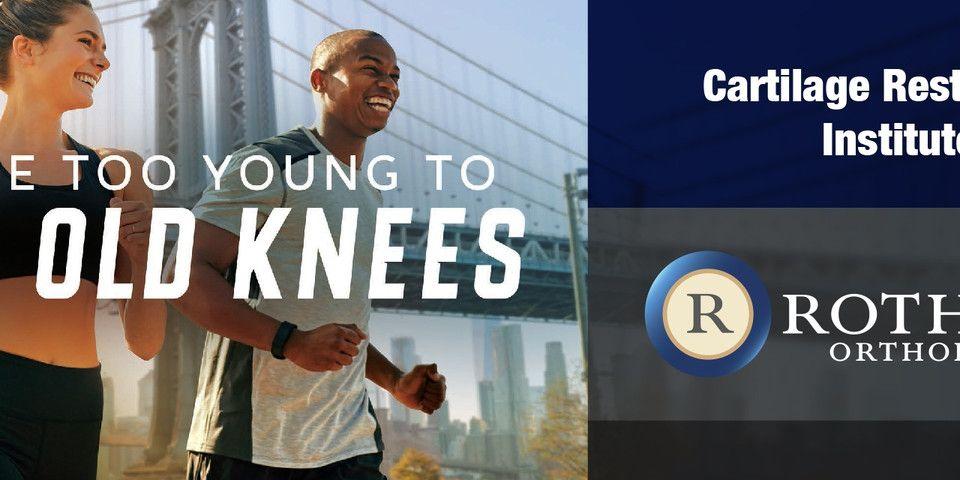Hearing a Pop in the Knee? Three Steps to Take Today
Learn What Conditions Cause a Knee Pop and How to Treat Them
Hearing a pop in the knee can be alarming, especially if you notice swelling or pain directly following. Similarly, a pop in the knee with no swelling afterwards may cause you confusion and make you wonder if you need to be concerned at all. While this mysterious noise might be nothing to worry about, taking measures to treat the possible injury will hinder (and maybe prevent) its progression.
The knee specialists at Rothman Orthopaedics have diagnosed and treated plenty of knee pops during their time in the field of orthopaedics. We understand that the uncertainty of this symptom can cause patients stress. For this reason, we want to keep our patients as informed as possible by providing clear communication, expert advice, and the most advanced methods of treatment.
Possible Causes of a Knee Pop
Some associate a knee pop with solely one condition, when actually this can point to a number of knee conditions. Below is a list of possible causes and a few knee conditions in which the afflicted might hear or feel a knee pop:
-
Crepitus: Crepitus describes the popping, grating, or creaking sensations and sounds within the joint. A buildup of gas bubbles in the surrounding areas of the joint and the sudden release of the gas may cause these noises. While crepitus is typically painless and of no concern, any accompanying symptoms such as swelling or discomfort indicate the affected person should take precautionary measures and see a specialist.
-
Meniscal tear: The combined symptoms of a pop in the knee and swelling are associated with a meniscal tear. Some patients, however, may not experience these symptoms after a certain amount of time of inactivity but still have a tear.
-
Knee arthritis: Several types of arthritis can form in the knee, such as osteoarthritis or inflammatory arthritis. Because general symptoms of these conditions include stiffness, swelling, and instability of the knee joint, the knee may pop as a result.
-
Ligament injuries: The four ligaments that stabilize the knee are the anterior cruciate (ACL,) posterior cruciate (PCL,) medial collateral (MCL,) and the lateral collateral (LCL.) An impact injury or abrupt tear in any of these ligaments may cause the knee to pop, depending on the circumstances of the injury.
Three Ways to Treat a Pop in the Knee
While the above orthopaedic conditions should be directly diagnosed and treated by a specialist, we have provided a few common recommendations knee doctors make when knee popping occurs. Talk to your physician before attempting to treat any injury yourself.
-
R.I.C.E.: For many injuries, to the knee or another part of the body, doctors suggest using the R.I.C.E. first. Rest, ice, compression, and elevation can reduce inflammation and pain and promote faster healing.
-
Proper immobilization: In addition to rest and compression, your physician may advise that you use a brace to prevent your knee from moving and to help you reduce discomfort. Depending on the type of brace and the particular patient’s living conditions, crutches may also be prescribed.
-
Rehabilitation exercises: Sometimes, a pop in the knee indicates instability, and thus the knee requires stronger surrounding muscles to support it during activity. Strengthening rehabilitation exercises, either given by your knee specialist or a physical therapist, can assist in stabilizing the area. While performing these activities, make sure to report any sensations of discomfort to a medical professional immediately. On a similar note, do not exercise too much at once, as overexertion of the area may worsen the condition.
At Rothman Orthopaedics , our orthopaedic knee specialists utilize the best diagnostic tools and their medical skills to understand what is functionally wrong with a patient’s knee. We value our patient’s desire for answers and strive to provide them with the best all-around treatment possible. To schedule an appointment with a knee specialist, or for more information about hearing a pop in the knee, please visit us here or contact us at 1-800-321-9999.
Related Specialties
Related Conditions
Related Programs
-

Cartilage Restoration Institute
This is a center where patients can go to have their disabled joint biological resurfaced, realigned, and stabilized without having the joint replaced by artificial materials such as metal and plastic. It is well known that the outcomes of patients under the age of 50 undergoing artificial joint replacement are not as good as we would like. Therefore we feel the future of Orthopaedics is to try to restore a joint back to its original anatomy by realignment, ligament reconstruction, and cartilage restoration.Read More




